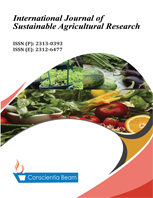Improvement of Maize Productivity (Zea Mays L.) by Mycorrhizal Inoculation on Ferruginous Soil in Center of Benin
DOI:
https://doi.org/10.18488/journal.70.2017.43.63.76Abstract
The objective of our study was to evaluate the promoted effects of three arbuscular mycorrhizal fungi (AMF) on maize growth and yield on ferruginous soil in center of Benin. The maize variety used was EVDT 97 STR C1. The maize seeds were inoculated with each of three arbuscular mycorrhizal fungi (Glomus intraradices, Funneliformis mosseae and Rhizophagus cubens) combined with or not to mineral fertilizer dose recommended (50% of NPK). The experimental device was a completely randomized random block of nine treatments with four repetitions. The data collected were related to growth (height, diameter and leaf area), yield (biomass and grain yield), mycorrhization (frequency, intensity and number of spores) and NPK content. The maximum height, best seeds yield and larger leaf surface are obtained with maize plants treated with R. intraradices combined with 50% of NPK respectively surpassing of 17.44%, 38.14%, 45.99% the values obtained with the controls plants. G. cubens combined with 50% of NPK was induced an increase of diameter (6.50%), dry aerial biomass (32.86%) and dry ground biomass (94.73%) compared to the control. G. cubens only has led to the best frequency (41.25%), intensity of mycorrhization (6.07%) and a high number of spore (1.81 spores/g soil). These results show the potential of these arbuscular mycorrhizal fungi to improve the maize productivity on ferruginous soil in center of Benin.

